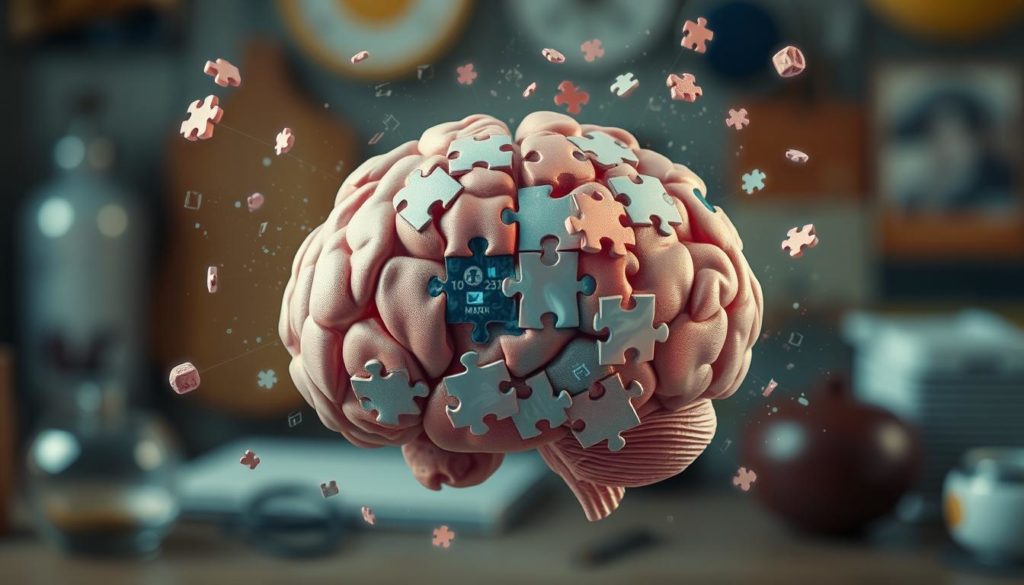An estimated 5.8 million Americans 65 and older live with Alzheimer’s. Recognizing Alzheimer’s early can greatly improve life quality and slow its progression. Symptoms often start small and get worse quickly, affecting thinking.
Watch for any forgetfulness in day-to-day life, as it might be Alzheimer’s or related dementia. Though it mainly hits those in their mid-60s, younger people can get it too.
Knowing the early signs and acting fast is key in controlling the disease. Taking early action can help keep a better quality of life.
Understanding Alzheimer’s Disease
Alzheimer’s disease is a brain disorder that mostly affects older people but it can also appear early. It is the top reason for dementia, causing a slow decline in thinking skills. This decline keeps getting worse over time.

What is Alzheimer’s Disease?
Alzheimer’s disease occurs when harmful amyloid plaques and tau tangles build up in the brain. These proteins block the way neurons talk to each other, leading to cell death. This causes a decrease in thinking abilities. The disease starts with small memory problems and can end with severe memory loss and changes in behavior.
Who is at Risk for Alzheimer’s Disease?
The exact cause of Alzheimer’s disease is still a mystery, but we know some risk factors. Age is the biggest risk, but genetics also play a role. Having a specific gene, APOE-e4, can make it more likely to develop Alzheimer’s. Lifestyle and other health conditions like heart disease and diabetes also affect your risk.
Memory Loss in Alzheimer’s
One of the most clear signs of Alzheimer’s is its effect on memory. This memory loss shows up in subtle ways at the start. Knowing these signs is key to recognizing Alzheimer’s early.
Short-term Memory Impairment
Short-term memory problems are often the first hint of Alzheimer’s. People with Alzheimer’s might have trouble remembering things that just happened. They may ask the same things over and over or forget recent information.
This type of memory loss affects everyday life. It makes normal tasks harder as time goes on.

Forgetting Important Dates and Events
Forgetting big days and events is another early sign of Alzheimer’s. Someone with Alzheimer’s might skip appointments or forget big days like birthdays or anniversaries. This leads to a lot of frustration and confusion for everyone involved.
| Alzheimer’s Disease Early Symptoms | Impact on Daily Life |
|---|---|
| Short-term Memory Impairment | Difficulty retaining recent information, repeating questions |
| Forgetting Important Dates and Events | Missing appointments, overlooking personal milestones |
Identifying Mild Cognitive Impairment
Mild Cognitive Impairment (MCI) is when a person notices they’re not thinking as sharply as before. They might forget things or have trouble making decisions. This isn’t enough to disrupt their daily life, but it’s more than what’s expected at their age.
Symptoms of Mild Cognitive Impairment (MCI)
Spotting the signs of MCI early can really help. People with MCI might:
- Lose track of what they’re doing or important dates
- Struggle to find the right words
- Find it harder to make choices
- Often misplace things
MCI vs. Alzheimer’s: What’s the Difference?
It’s key to tell MCI apart from Alzheimer’s disease. They seem similar but have big differences:
| Characteristic | MCI | Alzheimer’s |
|---|---|---|
| Severity of Memory Loss | Mild, doesn’t ruin daily tasks | Severe, messes with daily life |
| Progression | May stay the same or get worse | Always gets worse, can’t be reversed |
| Impact on Routine Activities | Little impact | Big impact |
Noticing MCI early can really help manage it better. It’s crucial to keep an eye on how our minds work.
Early Signs of Alzheimer’s
Spotting Alzheimer’s early signs can make a big difference. It means getting the right help sooner. Certain behaviors can signal cognitive decline.
Challenges with Problem Solving
Challenges with problem solving are clear early signs. Difficulty may appear in following simple recipes or handling bills. Even routine tasks can become hard, showing a decline in cognition.
Difficulty with Familiar Tasks
Struggling with everyday tasks is another key sign. It can make common activities tough, whether at home, work, or leisure. For example, getting lost while driving familiar routes, forgetting game rules, or not knowing how to use home appliances highlights this difficulty.
Behavioral Changes in Alzheimer’s
As Alzheimer’s disease gets worse, people can show big changes in behavior. Spotting these changes early is key for getting the right care. This helps a lot.
Increased Anxiety and Aggression
Feeling more anxious and aggressive is common in Alzheimer’s. People may get easily upset or angry. This is because they’re struggling to cope.
Such behaviors can get worse due to changes in their surroundings or daily routines. This often gets bad in the evening. To manage this, staying calm and making their environment stress-free can help.
Withdrawal from Social Activities
Another clear symptom is pulling away from friends and fun activities. They may avoid talking to people. This happens because they feel confused or very tired mentally.
It’s important to know about these behaviors. Creating a kind, active setting encourages them to interact more and keeps their minds alert.
“Living with Alzheimer’s requires navigating the behavioral challenges with sensitivity and patience, adapting care approaches to best support the emotional well-being of those affected.” – Dr. Maria Carrillo, Alzheimer’s Association
Here’s a quick list of common behavioral changes and possible reasons:
| Behavioral Change | Potential Triggers |
|---|---|
| Anxiety | Environmental changes, lack of routine, cognitive decline |
| Aggression | Feeling overwhelmed, frustration, external stimuli |
| Social Withdrawal | Confusion, depression, cognitive fatigue |
By understanding and tackling these changes, we can better life for those with Alzheimer’s. This leads to a more peaceful and supportive care setting.
Recognizing Alzheimer’s Early
It’s vital to recognize Alzheimer’s early. This allows for a plan that can slow symptom progression. Detecting the disease early lets families and patients look into treatment options. They can engage in cognitive therapies and make plans for future care.
The Importance of Early Detection
Early detection of Alzheimer’s has many benefits. It leads to early intervention and medical treatment. Changes in lifestyle can also improve life quality. Patients get a chance to join clinical trials and access support sooner. This helps manage symptoms better. Early detection also gives families time to prepare for the future.
Common Early Symptoms
Several early symptoms are common indicators of Alzheimer’s. Persistent forgetfulness, especially of recent events, is one sign. Trouble with making plans or solving problems may occur. Emotional changes, such as more anxiety and mood swings, are also common. These signs are crucial for early detection and should lead to medical advice.
| Early Symptom | Description |
|---|---|
| Forgetfulness | Increased tendency to forget newly learned information and important dates. |
| Problem-solving difficulties | Struggles with planning, problem-solving, and completing familiar tasks. |
| Emotional changes | Noticeable mood swings, increased anxiety, and confusion. |
Warning Signs of Dementia
Noticing the warning signs of dementia early can be vital for getting help promptly. It’s key to know the difference between normal aging signs and the early symptoms of Alzheimer’s disease.
Memory Issues vs. Typical Age-Related Changes
Normal changes with age might lead to sometimes forgetting names or appointments, then remembering them later. But, serious memory problems, like often forgetting recent things, asking the same questions over and over, or needing help to remember daily tasks, may hint at warning signs of dementia.
Signs to Watch Out For
Besides trouble with memory, early signs of Alzheimer’s disease may include difficulty understanding space, making odd decisions, and trouble with familiar tasks. People might also get confused about the time or place, show poor judgment, and start pulling away from work or social life. These issues are much more severe than the occasional forgetfulness seen with aging.
- Problems with language, like trouble following or joining talks.
- Difficulty understanding visual info and spatial relationships, which may affect driving skills.
- Making bad decisions, often seen in handling money.
- Quitting work, hobbies, or social events because of difficulties in conversing or completing activities.
- Noticeable changes in mood and personality, leading to being easily upset, confused, or anxious.
Cognitive Decline Signs
Signs of cognitive decline are not just about forgetting things. People may find it hard to use words correctly, understand what they see, solve problems, or do tasks they know. When someone has Alzheimer’s disease, these problems get worse.
For example, a person might have trouble picking the right words when talking. Or they could find it hard to grasp what they’re looking at. Over time, these issues may lead to severe confusion. Also, their ability to solve problems can get worse, making it hard to plan or organize.
It’s very important to notice signs of cognitive decline early. Doing so can help slow down the effects of Alzheimer’s disease. Knowing what to look for helps caregivers and family support their loved ones better. If you see any of these signs in yourself or someone else, it’s smart to talk to a doctor.
How Alzheimer’s Disease is Diagnosed?
Diagnosing Alzheimer’s includes looking at medical history, doing cognitive tests, and using imaging to see brain changes. Every step is crucial for a correct diagnosis and treatment of Alzheimer’s disease.
Diagnostic Tests and Procedures
Doctors have various tests to identify Alzheimer’s. These are some of them:
- Reviewing medical history to find any problems related to memory loss.
- Cognitive testing to check memory, problem-solving, and thinking skills.
- Neuroimaging techniques like MRI or CT scans show brain structure.
- Blood tests help rule out other causes for symptoms.
- PET scans look for amyloid plaques, key markers of Alzheimer’s.
For more details on these methods, speaking with experts or visiting resources like National Institute on Aging is helpful.
When to Consult a Specialist
If you notice memory loss or cognitive issues, seeing a healthcare provider quickly is key. Neurologists, in particular, can conduct thorough exams to confirm Alzheimer’s. Early diagnosis means early care, which can improve life quality.
| Steps in Alzheimer’s Diagnosis | Purpose |
|---|---|
| Medical History Review | Identify pre-existing conditions influencing symptoms. |
| Cognitive Testing | Assess cognitive impairments and memory issues. |
| Imaging Techniques | Visualize brain changes and deterioration. |
| Blood Tests | Exclude other causes for cognitive symptoms. |
| PET Scans | Detect amyloid plaques associated with Alzheimer’s. |
Alzheimer’s Early Detection
Finding out about Alzheimer’s early can really help patients and their families. It makes it possible to start treatments and ways of care that help keep the mind working well. It can also help in handling the way a person acts better.
Benefits of Early Diagnosis
Knowing Alzheimer’s is there early means you can get to treatments that might slow it down. It helps people look ahead. They can decide on health care and money matters. Plus, they can change how they live to deal with the disease better.
Living with an Early Diagnosis
When you know early you have Alzheimer’s, you can join studies that help and give more info. This helps you get ready for what’s coming. It lets you improve your life by changing daily activities and care plans ahead of time.
| Benefit | Description |
|---|---|
| Access to Treatments | Beneficial drugs and interventions can be utilized sooner to manage symptoms. |
| Future Planning | Allows individuals and families to make important decisions regarding care and finances. |
| Research Participation | Enables participation in clinical trials that could provide further support and insights. |
| Lifestyle Adjustments | Encourages making changes that can help manage day-to-day life more effectively. |
Frequently Asked Questions about Early Signs of Alzheimer’s
Understanding the early signs of Alzheimer’s is crucial. It helps tell the difference between Alzheimer’s and normal aging. We’ll answer common questions and concerns here.
What are the First Signs of Alzheimer’s?
The first signs of Alzheimer’s include memory lapses that affect daily life. Key signs are:
- Difficulty remembering recent events or info.
- Challenges with problem-solving and planning.
- Mood swings and changes in personality.
It’s vital to know the difference between these symptoms and normal aging. Normal aging might mean sometimes forgetting things. But Alzheimer’s leads to a greater loss of cognitive skills.
Is Forgetfulness Normal With Aging?
A lot of people wonder if forgetfulness is just part of getting older. Indeed, some forgetfulness can happen as we age. Yet, Alzheimer’s involves serious memory issues that keep happening.
“Forgetting key dates, asking the same things over and over, or struggling with everyday tasks points to a need for a closer look,” says Dr. John Doe, an Alzheimer’s expert.
| Aspect | Normal Aging | Alzheimer’s |
|---|---|---|
| Memory | Occasional forgetfulness | Regular memory loss |
| Problem Solving | Minor changes in ability | Big problems with planning |
| Mood | Generally stable but sometimes upset | Big mood swings |
Knowing the differences between Alzheimer’s and normal aging is key for early detection. Early detection of Alzheimer’s leads to better care. It stresses the importance of recognizing these early signs.
Conclusion: Taking the Next Steps
If you notice early Alzheimer’s signs, it’s important to act quickly. The first steps involve talking to doctors and getting a full health check-up. They will use tests and brain scans to understand the person’s mental health better.
Dealing with Alzheimer’s means both medical care and daily life changes to stay as healthy as possible. Making a day-to-day plan, using reminders, and keeping the home safe can help a lot. It’s also key to exercise, eat well, and keep in touch with friends for a good mind.
Having a strong support circle is vital when diagnosed with Alzheimer’s. Joining local help groups and getting advice from the Alzheimer’s Association is wise. Include family and pals in planning for care. These steps help everyone handle what comes next better, ready for any changes.
FAQ
What are the First Signs of Alzheimer’s?
Early Alzheimer’s signs include forgetting a lot, problems with solving issues, and mood changes. It’s normal to forget things sometimes as we age. But, forgetting key details often may hint at Alzheimer’s.
Is Forgetfulness Normal With Aging?
Yes, it’s common to forget things like where you put your keys or someone’s name as you get older. But, if memory loss is making everyday tasks hard, it might be a sign of Alzheimer’s.
What is Alzheimer’s Disease?
Alzheimer’s is a brain disease that gets worse over time. It causes major memory loss and decreases thinking and reasoning skills. It’s the most common type of dementia, causing issues with memory and behavior.
Who is at Risk for Alzheimer’s Disease?
Alzheimer’s mostly affects people over 65, but it can start earlier, in your 30s or 40s. Your genes play a big role, especially in cases that start young.
What is Short-term Memory Impairment in Alzheimer’s?
In Alzheimer’s, you may struggle to remember new information. Forgetting important dates or events can mess with daily life. This memory issue is often one of the first signs of Alzheimer’s.
What are the Symptoms of Mild Cognitive Impairment (MCI)?
MCI brings memory problems more severe than normal aging. You might forget events or struggle with words and decision-making. MCI can hint at Alzheimer’s, but not everyone with MCI gets it.
How is MCI Different from Alzheimer’s?
MCI means you have memory issues that don’t ruin daily life. Alzheimer’s causes serious memory loss and problems with daily tasks.
What are the Challenges with Problem Solving in Alzheimer’s?
People with early Alzheimer’s may find problem-solving hard. Following a simple recipe or handling money becomes difficult. These issues mark the start of Alzheimer’s.
What Behavioral Changes Occur in Alzheimer’s?
Alzheimer’s can change a person’s behavior. They might feel more anxious or angry, and act differently at work or with friends. These behavioral changes often happen with memory issues.
Why is Early Detection of Alzheimer’s Important?
Finding Alzheimer’s early is key. It helps manage symptoms and plan for the future. Treatments can work better early on. Diagnosis also means making lifestyle changes sooner.
What are Warning Signs of Dementia to Watch Out For?
Watch for memory problems that affect daily life, understanding space, and problem-solving. Trouble with words, seeing things clearly, and making decisions are also signs.
How is Alzheimer’s Disease Diagnosed?
Doctors look at your medical past and test your thinking and memory to diagnose Alzheimer’s. Brain scans can also help. Speak to a doctor if you notice memory or thinking changes.
What are the Benefits of an Early Alzheimer’s Diagnosis?
Early diagnosis lets you use treatments that may slow the disease. It also means planning health and money decisions early and joining studies.


